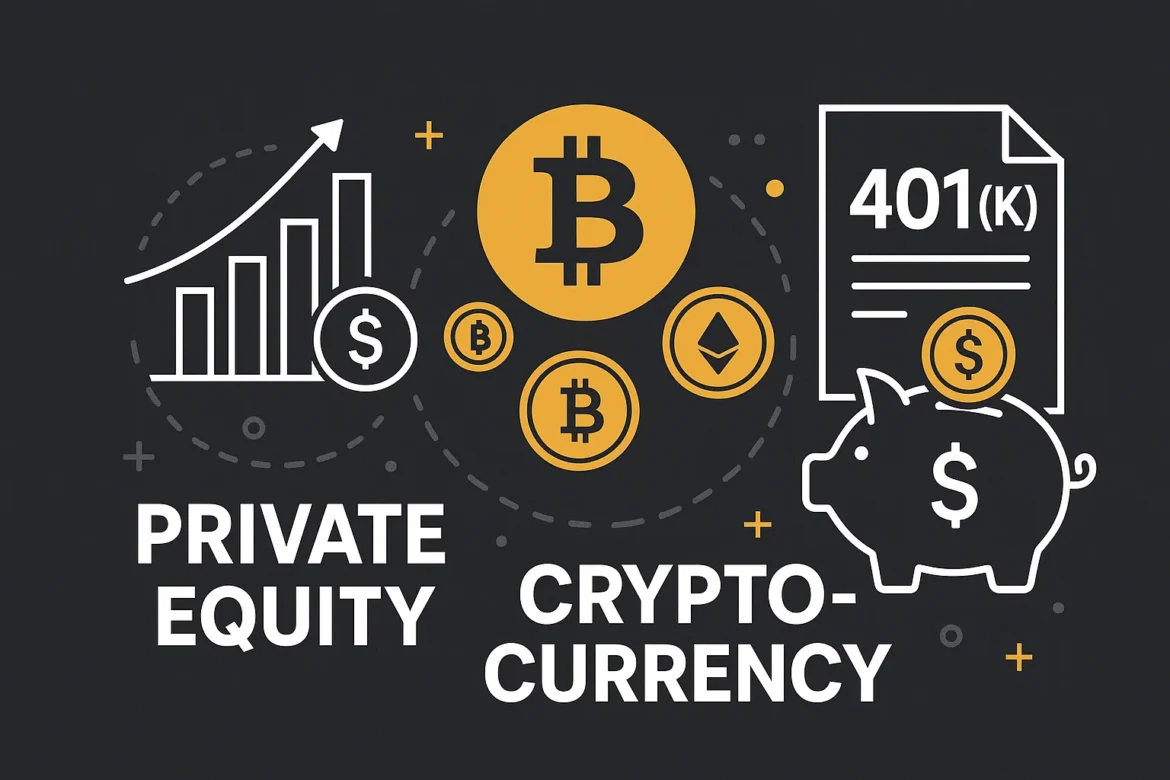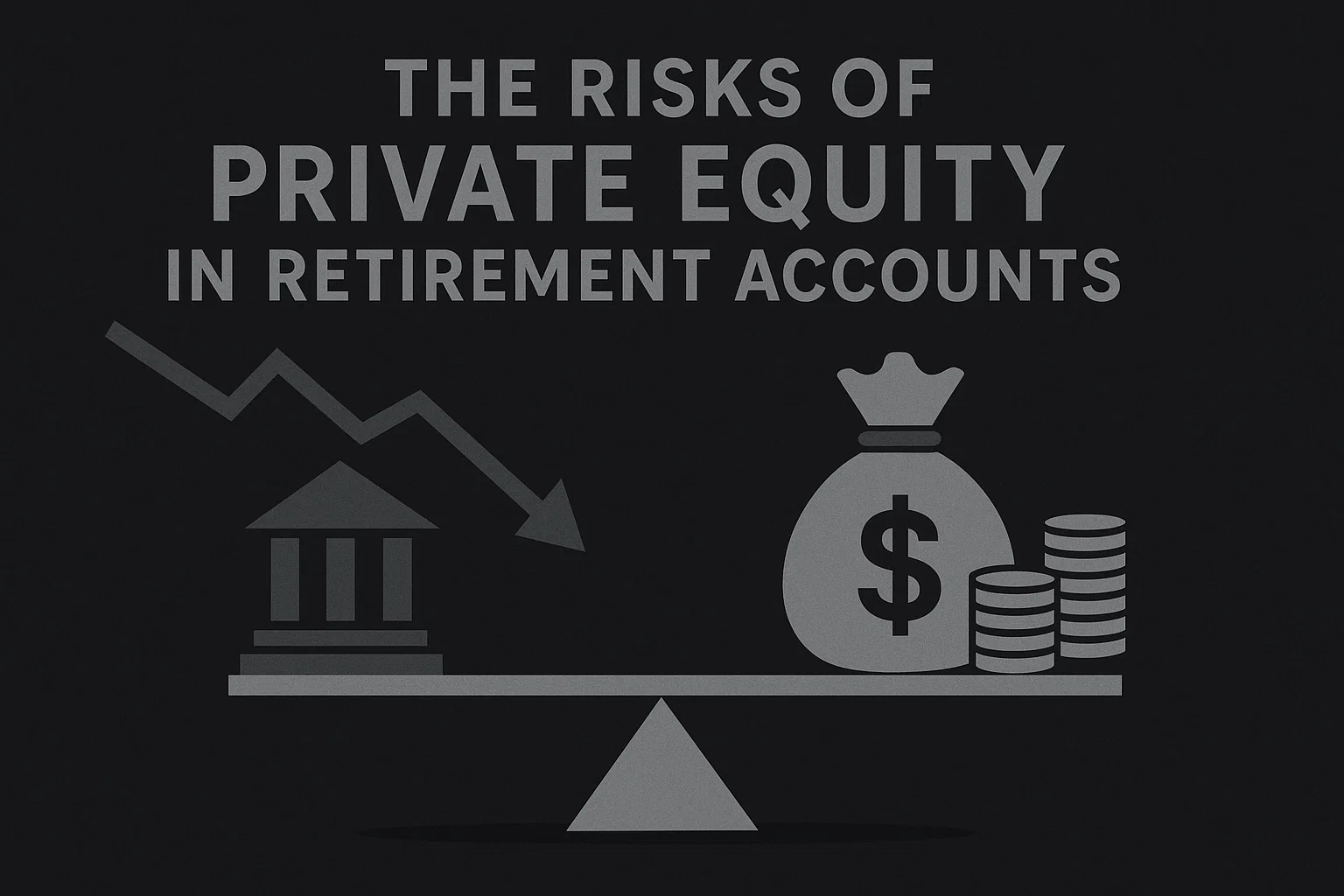The landscape of retirement investing is facing unprecedented scrutiny as a senior United States senator raises urgent concerns about allowing private equity cryptocurrency 401 (k) options in Americans’ retirement plans. This warning comes at a critical time when financial institutions are pushing to expand alternative investment options beyond traditional stocks and bonds. The senator’s stark message centers on one troubling reality: millions of Americans could face substantial losses if these complex, volatile assets become standard offerings in workplace retirement accounts. As private equity cryptocurrency 401 (k) proposals gain momentum in Washington, understanding the risks, rewards, and regulatory implications has never been more important for workers planning their financial futures.
Warning About Private Equity and Cryptocurrency in Retirement Plans
The senior senator’s concerns about private equity cryptocurrency 401 investments stem from fundamental differences between these alternative assets and traditional retirement investments. Unlike publicly traded stocks that offer daily liquidity and transparent pricing, private equity investments lock up capital for years, often 7-10 years or longer. Cryptocurrency markets, while liquid, experience extreme volatility that can devastate retirement savings during market downturns.
The Core Issues with Alternative Investments in 401(k) Plans
Traditional 401(k) plans have historically focused on mutual funds, target-date funds, and exchange-traded funds that provide diversification, liquidity, and regulatory oversight. These conventional options allow workers to access their money when needed and understand their investment performance through standardized reporting.
Private equity cryptocurrency 4401 (k)proposals fundamentally challenge this model. Private equity investments involve purchasing stakes in privately held companies, requiring sophisticated due diligence and long holding periods. Cryptocurrency investments introduce digital assets with no intrinsic value backing, relying entirely on market sentiment and speculative demand.
The senator’s warning highlights several critical vulnerabilities:
Liquidity constraints plague private equity investments, meaning workers facing emergencies cannot easily access their retirement funds without significant penalties or delays. This lack of flexibility contradicts the fundamental purpose of 401(k) accounts as accessible retirement savings vehicles.
Valuation opacity creates another significant problem. Private equity holdings lack daily market pricing, making it difficult for workers to understand their true account balances. This opacity can mask losses until it’s too late to make corrective investment decisions.
Fee structures in private equity and cryptocurrency investments often dwarf those of traditional mutual funds. Management fees of 2% plus performance fees of 20% are standard in private equity, while cryptocurrency trading platforms charge transaction fees, custody fees, and spread costs that accumulate rapidly.
Why Senators Are Raising Concerns About 401(k) Alternative Investments
The push to include private equity cryptocurrency 401 (k) options represents a significant departure from decades of retirement policy focused on protecting American workers. Senators concerned about this trend recognize that most employees lack the financial sophistication to evaluate these complex investments appropriately.
The Fiduciary Responsibility Question
Retirement plan sponsors owe fiduciary duties to their employees, requiring them to act in participants’ best interests. Introducing private equity cryptocurrency 401 (k) options creates enormous liability challenges for employers who must evaluate whether these investments serve their workforce appropriately.
The senator’s warning emphasizes that private equity and cryptocurrency investments were designed for wealthy, sophisticated investors who can afford substantial losses. Pension funds and endowments employ teams of investment professionals to conduct extensive due diligence before committing capital to these strategies. Individual workers lack these resources and expertise.
Retirement account safety concerns extend beyond individual investment choices. When workers allocate excessive retirement savings to high-risk alternatives, they may discover too late that their nest egg has evaporated. Unlike younger investors who can recover from market losses over decades, workers approaching retirement lack time to rebuild devastated accounts.
Historical Context of Retirement Investment Protections
Congress enacted the Employee Retirement Income Security Act (ERISA) in 1974 specifically to protect American workers’ retirement savings. This landmark legislation established fiduciary standards, disclosure requirements, and enforcement mechanisms to prevent the pension abuses prevalent in earlier decades.
The current push for private equity cryptocurrency 401 investments threatens to undermine these protections. Proponents argue that workers should have investment freedom and access to potentially higher returns. Critics, including the warning senator, counter that freedom without adequate safeguards becomes a pathway to financial ruin for unsophisticated investors.
The Risks of Private Equity in Retirement Accounts
Private equity investments carry unique characteristics that make them particularly unsuitable for most 401(k) participants. Understanding these risks helps explain why senators are sounding alarms about private equity cryptocurrency 4401 (k)proposals.
Illiquidity and Long Lock-Up Periods
Private equity funds typically require 10-year commitments, with most capital called and deployed over the first 3-5 years. Investors cannot withdraw funds during this period, creating severe problems for 401(k) participants who may need emergency access to retirement savings.
This illiquidity becomes especially problematic during market downturns when workers face job losses or medical emergencies. Traditional 401(k) investments allow hardship withdrawals or loans, providing financial flexibility during crises. Private equity cryptocurrency 401 (k) holdings could trap workers’ money precisely when they need it most.
Valuation Challenges and Performance Reporting
Private equity funds report valuations quarterly, relying on subjective assessments rather than market-based pricing. Fund managers often mark holdings optimistically, creating unrealistic performance reports that mislead investors about actual returns.
This valuation opacity becomes particularly dangerous in private equity cryptocurrency 401 (k) contexts because workers cannot make informed rebalancing decisions. When public markets decline, workers can reduce equity exposure and shift toward bonds. Private equity’s delayed and subjective valuations prevent timely risk management.
Fee Structures That Erode Returns
The infamous “2 and 20” fee structure standard in private equity means investors pay 2% annual management fees plus 20% of profits above a hurdle rate. These fees compound over time, substantially reducing net returns even when underlying investments perform well.
Academic research consistently demonstrates that fees matter enormously for long-term retirement outcomes. A worker investing $500 monthly for 30 years faces dramatically different outcomes depending on fee levels. Traditional index funds charging 0.05% preserve far more wealth than private equity funds charging 2-3% annually.
Cryptocurrency Risks in 401(k) Retirement Plans
While private equity poses serious risks, cryptocurrency investments in private equity cryptocurrency 401 (k) plans present even more extreme dangers for retirement savers. The cryptocurrency market’s volatility, lack of regulatory oversight, and susceptibility to fraud create a perfect storm of risks for unsophisticated investors.
Extreme Volatility and Market Crashes
Bitcoin, the largest cryptocurrency, has experienced multiple 70-80% drawdowns during its existence. These crashes occur rapidly, sometimes within weeks, giving investors little time to react. Workers who allocated significant 401(k) assets to cryptocurrency during peak enthusiasm have watched helplessly as their retirement savings evaporated.
The senator’s warning specifically addresses this volatility problem. Traditional retirement planning assumes moderate volatility that allows for recovery over time. Cryptocurrency investments exhibit volatility levels that can permanently impair retirement readiness when losses occur close to retirement age.
Regulatory Uncertainty and Investor Protection Gaps
Unlike stocks and bonds subject to Securities and Exchange Commission oversight, cryptocurrencies exist in a regulatory gray zone. This lack of a clear regulatory framework means investors enjoy fewer protections against fraud, manipulation, and market abuse.
Private equity cryptocurrency 401 (k) proposals would expose millions of workers to assets lacking the investor protections developed over decades of securities regulation. When cryptocurrency exchanges collapse or founders commit fraud, investors typically have no recourse for recovering losses.
Security Risks and Custody Challenges
Cryptocurrency custody presents unique technical challenges that traditional financial assets don’t face. Private keys must be stored securely, exchanges can be hacked, and human error can result in permanent loss of assets. These custody risks make cryptocurrency unsuitable for retirement accounts where security and reliability are paramount.
The 401(k) system relies on established custodians and recordkeepers with proven track records protecting retirement assets. Introducing cryptocurrency investments into this ecosystem creates new vulnerabilities that could expose millions of accounts to theft or loss through technical failures.
What the Senator’s Warning Means for American Workers
The senior senator’s concerns about private equity cryptocurrency 401 investments reflect broader anxieties about retirement security in America. With traditional pensions disappearing and Social Security facing long-term funding challenges, workers increasingly depend on 401(k) accounts as their primary retirement savings vehicle.
The Retirement Crisis Context
Most Americans are woefully unprepared for retirement. The median 401(k) balance for workers approaching retirement age remains below $100,000, far short of what’s needed for financial security in retirement. Against this backdrop, introducing high-risk, high-fee alternative investments into retirement plans seems particularly reckless.
The senator’s warning recognizes that workers facing retirement savings shortfalls may view private equity and cryptocurrency as lottery tickets offering last chances for catching up. This desperation-driven investment behavior typically ends badly, with workers suffering devastating losses that cannot be recovered.
Behavioral Finance and Decision-Making Biases
Decades of behavioral finance research demonstrate that individual investors consistently make poor decisions driven by cognitive biases. They chase past performance, panic sell during downturns, and overestimate their ability to time markets. These behavioral tendencies become especially dangerous with private equity cryptocurrency 4401investments, where complexity and volatility amplify potential mistakes.
Senators concerned about retirement security understand that investment freedom must be balanced against investor protection. Allowing complex, risky investments in 401(k) plans without adequate safeguards sets up workers for failure regardless of their good intentions.
The Industry Push for Alternative Investments in 401(k) Plans
Despite senatorial warnings, financial industry pressure to include private equity cryptocurrency 4401 (k)options continues mounting. Understanding the motivations behind this push helps explain why the debate has become so contentious.
Fee Revenue Opportunities for Financial Firms
Private equity and cryptocurrency investments generate substantially higher fees than traditional mutual funds. For financial services companies facing fee compression in conventional investment products, alternative investments represent lucrative revenue opportunities.
This profit motive creates conflicts of interest when firms recommend private equity cryptocurrency 401 (k) options to plan sponsors. While firms claim these investments benefit workers through diversification and higher returns, the reality is that fee revenue drives much of the industry’s enthusiasm for alternatives.
The Democratization Argument
Proponents of alternative investments in retirement plans argue that ordinary workers deserve access to the same investment opportunities available to wealthy individuals and institutions. This “democratization” narrative sounds appealing, but it ignores fundamental differences between sophisticated and unsophisticated investors.
Wealthy investors allocating a small percentage of diversified portfolios to private equity or cryptocurrency face manageable risks. Workers concentrating substantial retirement savings in these alternatives face catastrophic risks. The senator’s warning emphasizes this critical distinction that democratization arguments conveniently overlook.
Regulatory Response and Policy Considerations
The debate over private equity cryptocurrency 401 investments has prompted regulatory attention from the Department of Labor, which oversees ERISA compliance and fiduciary standards for retirement plans.
Department of Labor Guidance
The Department of Labor has issued cautionary guidance regarding cryptocurrency investments in 401(k) plans, questioning whether plan sponsors can fulfill fiduciary duties when offering these volatile, poorly understood assets. This guidance has slowed but not stopped the movement toward including digital assets in retirement plans.
Retirement plan risks associated with private equity have received less regulatory scrutiny, partly because some large plans have included private equity options for years. However, these offerings typically appear in plans covering sophisticated employees at financial services firms, not typical American workers.
Legislative Proposals and Congressional Action
The senator’s warning may presage legislative action to restrict or prohibit certain alternative investments in 401(k) plans. Congressional Democrats concerned about retirement security have signaled interest in stronger worker protections, while Republicans generally favor expanded investment options and reduced regulation.
This political divide means that private equity cryptocurrency 4401 (k)policy will likely remain contentious, with outcomes depending on which party controls Congress and the White House. Workers caught in this political crossfire need to understand the risks regardless of eventual policy outcomes.
Protecting Your Retirement Savings: Practical Guidance
While policymakers debate private equity cryptocurrency 401 (k) regulations, workers must make immediate decisions about retirement investments. Understanding how to protect your savings becomes crucial in this uncertain environment.
Diversification Fundamentals
Sound retirement investing relies on diversification across asset classes, geographies, and investment styles. Traditional portfolios combining stock and bond index funds provide sufficient diversification for most workers without requiring exposure to private equity or cryptocurrency.
If your employer introduces alternative investments to your 401(k) plan, remember that these options should represent at most a small percentage of overall retirement savings. Most financial advisors recommend limiting alternatives to 5-10% of portfolios for investors who can afford the risks and understand the investments.
Understanding Your Risk Tolerance and Time Horizon
Workers within 10 years of retirement should avoid private equity cryptocurrency 401 (k) investments entirely. The time required to recover from potential losses exceeds your investment horizon, making these investments unsuitable regardless of potential returns.
Younger workers have more time to recover from investment mistakes, but should still approach alternative investments cautiously. Retirement account safety should always take priority over speculative gains, especially given the long-term nature of retirement investing.
Questions to Ask Before Investing in Alternatives
Before allocating retirement savings to private equity cryptocurrency 401 (kk options, ask yourself these critical questions:
Do I understand how this investment works and makes money? If you cannot explain the investment strategy in simple terms, you should not invest in it with retirement savings.
Can I afford to lose this money? Alternative investments carry substantial loss risks. Only invest amounts you can afford to lose entirely without jeopardizing retirement security.
Do I understand all fees and costs? Complex investments often hide fees in multiple layers. Demand complete fee disclosure before committing retirement funds.
How quickly can I access this money if needed? Understanding liquidity constraints helps prevent situations where you cannot access retirement savings during emergencies.
The Broader Implications for Retirement Policy
The senator’s warning about private equity cryptocurrency 401 investments reflects deeper questions about American retirement policy and the appropriate balance between freedom and protection.
The Shift from Defined Benefit to Defined Contribution Plans
Traditional pension plans transferred investment risk from workers to employers. The shift toward 401(k) plans shifted this risk onto workers, who must now make complex investment decisions with limited financial knowledge. This transformation has been called one of the greatest experiments in public policy, with outcomes still uncertain.
Adding alternative investments to 401(k) menus increases complexity and risk for workers already struggling with retirement planning. The senator’s concerns recognize that expanding investment options without corresponding education and protection creates conditions for widespread financial hardship.
International Perspectives on Retirement Investing
Many countries take more paternalistic approaches to retirement savings, limiting investment options to protect workers from themselves. Australia’s superannuation system, for example, restricts exotic investments and emphasizes low-cost, diversified portfolios.
The private equity cryptocurrency 4401 (k)debate raises fundamental questions about whether America should adopt similar protective measures or continue prioritizing individual choice over protection. The senator’s warning suggests that current policy may lean too far toward freedom at the expense of security.
Expert Opinions on Alternative Investments in Retirement Plans
Financial experts remain deeply divided on private equity cryptocurrency 401 (k) investments, with perspectives varying based on professional backgrounds and philosophical orientations.
Academic Research Findings
Academic finance research generally questions whether private equity delivers superior risk-adjusted returns compared to public market alternatives. Studies consistently find that after accounting for illiquidity, leverage, and fees, private equity’s net returns often disappoint relative to public equity indexes.
Cryptocurrency investments lack sufficient long-term performance history for definitive academic assessment, but research on behavioral finance and speculation consistently warns against including highly volatile, speculative assets in retirement portfolios.
Financial Advisor Perspectives
Certified Financial Planners typically advise clients to limit or avoid alternative investments in retirement accounts. These professionals recognize that complexity and high fees rarely benefit ordinary investors, despite marketing claims about superior returns.
Industry consultants working with plan sponsors face conflicting pressures. While fiduciary duties require acting in participants’ best interests, financial incentives from asset managers promoting alternatives create conflicts that the senator’s warning implicitly addresses.
Looking Ahead: The Future of 401(k) Investing
The debate over private equity cryptocurrency 401 investments will shape retirement policy for years to come. Understanding probable future scenarios helps workers prepare for the coming changes.
Regulatory Evolution
Expect continued regulatory attention to alternative investments in retirement plans. The Department of Labor will likely issue additional guidance clarifying fiduciary obligations when offering private equity, cryptocurrency, and other alternatives.
Whether regulations tighten or loosen depends largely on political outcomes and whether widespread losses from alternative investments materialize. The senator’s warning serves as an early alarm that could prevent policy mistakes or simply document concerns before predicted losses occur.
Industry Innovation and Product Development
Financial services firms will continue developing products, attempting to make private equity cryptocurrency401k investments more suitable for ordinary workers. Expect increased offerings of interval funds, tender offer funds, and other structures providing limited liquidity for alternative assets.
These product innovations may address some concerns about illiquidity and valuation opacity, but cannot eliminate fundamental risks associated with complex, high-fee investments. Workers should remain skeptical of marketing claims and focus on understanding actual risks.
Worker Education and Financial Literacy
Improving financial literacy represents the only sustainable solution to retirement plan risks associated with complex investments. Workers who understand diversification, fees, risk, and their own behavioral biases make better decisions regardless of available investment options.
The senator’s warning highlights the urgent need for enhanced retirement education, especially as 401(k) plans become more complex. Employers, government agencies, and nonprofit organizations must prioritize worker education to prevent predicted losses from alternative investments.
Conclusion
The senior senator’s stark warning about private equity cryptocurrency401k investments deserves serious attention from American workers, employers, and policymakers. While alternative investments may benefit sophisticated, wealthy investors, introducing them into ordinary workers’ retirement accounts creates serious risks of substantial losses that could devastate retirement security.
Retirement savings represent the culmination of decades of work and sacrifice. Protecting these hard-earned assets should take priority over speculative opportunities promising superior returns. Traditional diversified portfolios of stocks and bonds have successfully built retirement wealth for generations of Americans without requiring exposure to complex, high-fee alternatives.





